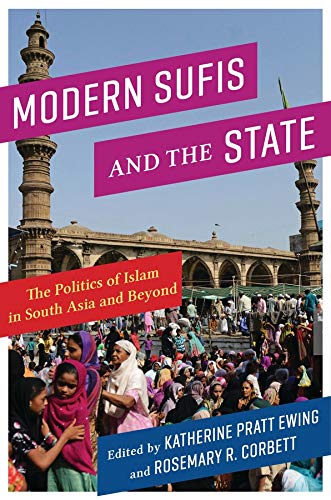Sufism is typically thought of as the mystical side of Islam. In recent years, it has been held up as a supposedly peaceful alternative to the spread of forms of Islam associated with violence, an embodiment of democratic ideals of tolerance and pluralism. Are Sufis in fact as otherworldy and apolitical as this stereotype suggests?
Modern Sufis and the State brings together a range of scholars, including anthropologists, historians, and religious-studies specialists, to challenge common assumptions that are made about Sufism today. Focusing on India and Pakistan within a broader global context, this book provides locally grounded accounts of how Sufis in South Asia have engaged in politics from the colonial period to the present. Contributors foreground the effects and unintended consequences of efforts to link Sufism with the spread of democracy and consider what roles scholars and governments have played in the making of twenty-first-century Sufism. They critique the belief that Salafism and Sufism are antithetical, offering nuanced analyses of the diversity, multivalence, and local embeddedness of Sufi political engagements and self-representations in Pakistan and India. Essays question the portrayal of Sufi shrines as sites of toleration, peace, and harmony, exploring cases of tension and conflict. A wide-ranging interdisciplinary collection, Modern Sufis and the State is a timely call to think critically about the role of public discourse in shaping perceptions of Sufism.
- Table of Contents
- Acknowledgments
- Note on Transliteration
- Introduction: Sufis and the State: The Politics of Islam in South Asia and Beyond, by Katherine Pratt Ewing
- Part I: Sufism and Its Modern Engagements with a Global Order
- 1. Anti-Colonial Militants or Liberal Peace Activists? The Role of Private Foundations in Producing Pacifist Sufis During the Cold War, by Rosemary R. Corbett
- 2. From Taṣawwuf Modern to Neo-Sufism: Nurcholish Madjid, Fazlur Rahman, and the Development of an Idea, by Verena Meyer
- 3. Beyond Barelwiism: Tahir-ul-Qadri as an Example of Trends in Global Sufism, by Marcia Hermansen
Commentary on Part I: Ambiguities and Ironic Reversals in the Categorization of Sufism, by Carl W. Ernst
- Commentary on Part I: Ambiguities and Ironic Reversals in the Categorization of Sufism, by Carl W. Ernst
- Part II: Sufis, Sharia, and Reform
- 4. Is the Taliban Anti-Sufi? Deobandi Discourses on Sufism in Contemporary Pakistan, by Brannon D. Ingram
- 5. Sufism Through the Prism of Sharia: A Reformist Barelwi Girls’ Madrasa in Uttar Pradesh, India, by Usha Sanyal
- 6. Lives of a Fatwa: Sufism, Music, and Islamic Reform in Kachchh, Gujarat, by Brian E. Bond
- Commentary on Part II:Sufis, Sharia, and Reform, by Muhammad Qasim Zaman
- Part III: Sufis and Politics in Pakistan
- 7. “A Way of Life Rather Than an Ideology?”: Sufism, Pīrs, and the Politics of Identity in Sindh, by Sarah Ansari
- 8. Sufi Politics and the War on Terror in Pakistan: Looking for an Alternative to Radical Islamism?, by Alix Philippon
- 9. “Our Vanished Lady”: Memory, Ritual, and Shiʿi-Sunni Relations at Bībī Pāk Dāman, by Noor Zaidi
- Commentary on Part III: The Problems and Perils of Translating Sufism as “Moderate Islam,” by SherAli Tareen
- Part IV: Sufism in Indian National Spaces
- 10. Is All Politics Local? Neighborhood Shrines and Religious Healing in Contemporary India, by Carla Bellamy
- 11. Sufi Healing and Secular Psychiatry in India, by Helene Basu
- 12. Sufi Sound, Sufi Space: Indian Cinema and the Mise-en-Scène of Pluralism, by Rachana Rao Umashankar
- Commentary on Part IV: Sufism in Indian National Spaces, by Bruce B. Lawrence
- Conclusion: Thinking Otherwise, by Rosemary R. Corbett
- Notes
- Glossary
- Bibliography
- List of Contributors
- Index

